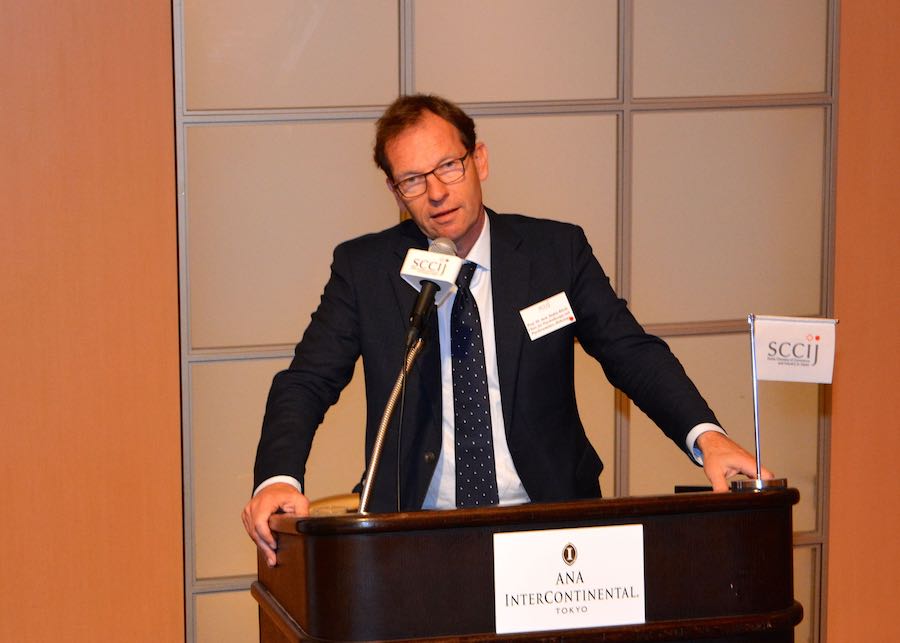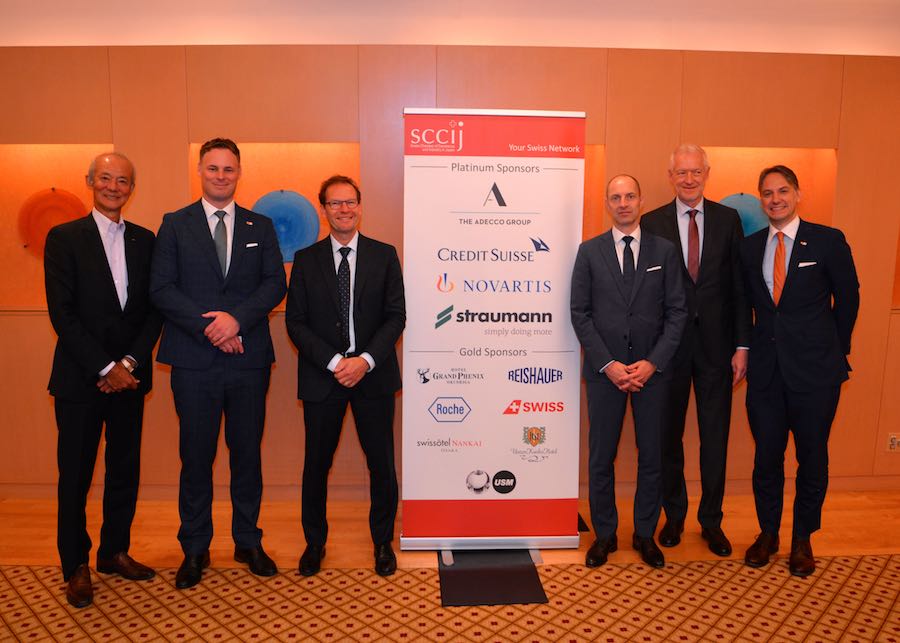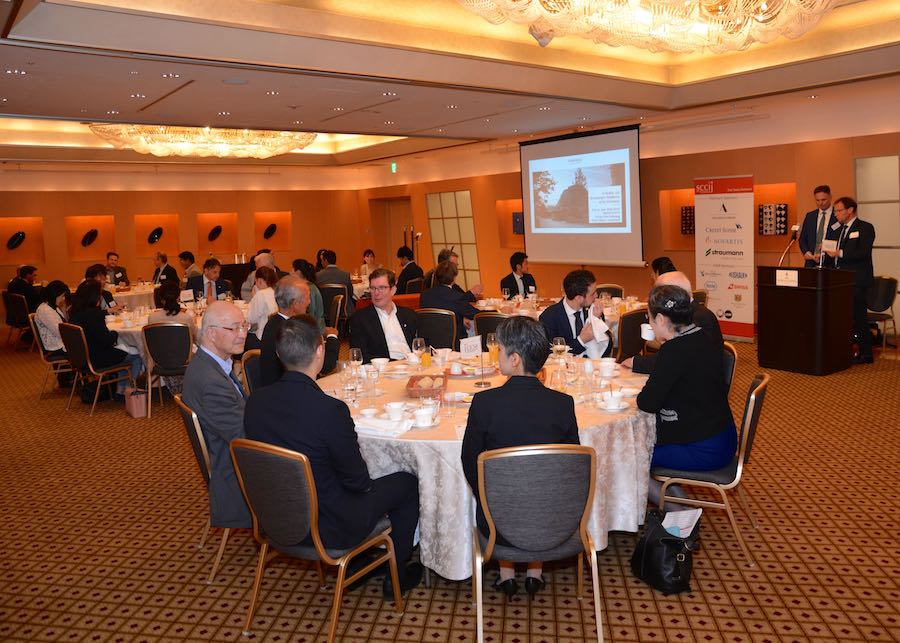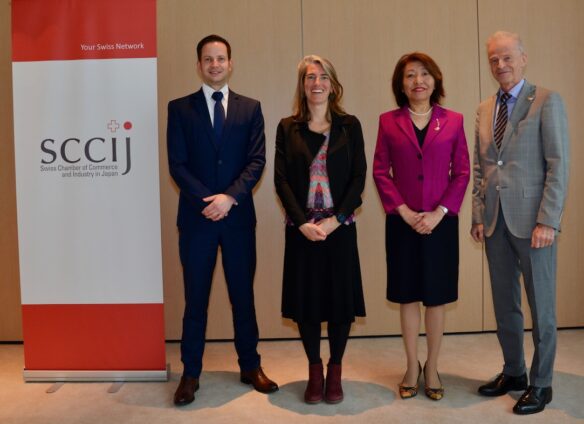Tokyo (SCCIJ) – At the October Luncheon with about 40 members and guests of the SCCIJ attending, the Swiss psychiatrist and psychotherapist Stefan Büchi, a professor at the University of Zurich, gave a captivating outlook on the factors of a healthy work environment. A culture of trust within a company would increase the resilience of its employees, Professor Büchi argued. The medical director of the Clinic for Psychotherapy and Psychosomatics in Hohenegg (Zurich) works currently as a guest professor at the University of Kyoto.

SCCIJ Luncheon speaker Swiss psychiatrist and psychotherapist Stefan Büchi
Resilience versus stress
The luncheon speaker started his talk with the emphasis that stress is a subjective factor. The impact of stress on the body and mind would depend on how a person evaluates its situation. “If you feel in control, then you can handle the same amount of stress which somebody else makes ill,” the Swiss expert said.
“But if you perceive the problem to be stronger than you, then you have negative stress which will make you anxious, depressed, and sick in the long-term,” he added. But Professor Büchi had a reassuring message: “The autonomous nervous system can be trained to become more resilient to stress.” Resilience would be equal to have better stress resistance.
How to generate health
But why are some people more resilient than others? As a path to the answer, the speaker introduced the concept of salutogenesis versus the established idea of pathogenesis. “In medicine, we think about illness and its causes, but one could also focus on health and its causes,” Professor Büchi surprised his audience.
The basis of salutogenesis is the concept of coherence: An individual perceives working life as comprehensible, controllable, and meaningful. This person views its situation as structured and consistent, feels in control of it, and sees it worthy of commitment; then, one can stay healthy. “Such people believe that life is good and there is a positive outcome, whatever happens,” the speaker said.

Members and advisors of the SCCIJ executive committee and Mr. Reubi, Deputy Head of Mission of the Embassy of Switzerland in Japan, with luncheon speaker Professor Stefan Büchi
Early basis for resilience
The ability of resilience develops early in life. Professor Büchi explained the results of a long-term study in a small Hawaiian island about the development of 700 people over 30 years. It concluded that the foundation of resilience is laid in childhood and influenced by reactions and outcomes of later life,” the expert summarized the result of the study.
Healthy people in the study had at least one reference person giving positive attention in childhood. Even if their parents were not functional, they would have found substitute persons in the family. Later, healthy people also found emotional support outside of their family, like close friends, a favorite teacher, or a priest.
Depicting your work problem
Professor Büchi introduced his concept PRISM to describe how a person deals with problems in his or her working life. His Pictorial Representation of Illness and Self Measure defines the location of a work problem in one’s life and whether one can separate oneself from this problem. “After this realization, you can start to talk about it,” the speaker said.
He confirmed the general perception that the number of burn-outs has risen. It would mostly occur in women of the age group 40 to 49 and men of the age group 50 to 60. At the same time, the job stress index proportions had not shifted. “One out of three employees is in a burn-out constellation, and one out of three feels healthy and protected,” he said.

“Culture of trust” required
How can employers create a healthy and stress-resistant work environment? Professor Büchi named trust as the most psychological protective factor. According to the sociologist Niklas Luhmann, trust is a social mechanism that reduces complexity and allows more possibilities for experience and actions. Also, a “workplace 4.0” would provide for the growth and development of the employees, the expert added.
In the realm of an enterprise, various soft factors such as the organizational culture, transparent leadership and expectations, civility and respect transparency, and fear-free access to psychological support would be able to generate trust. “The ‘systemic resilience’ of a company is closely related to a culture of trust,” Professor Büchi stated at the end of the luncheon talk.
Biography of the speaker
Prof. Büchi holds the position of Medical Director at the Hohenegg Private Clinic (Zurich) since 2009. He is teaching at the University of Zurich and has authored over 70 peer-reviewed publications. A University of Zurich graduate, Professor Büchi specialized in psychiatry and psychotherapy in Switzerland and the United Kingdom. At the Imperial College London, he notably studied cognitive illness representation in chronic physical illness. In 2001, after several years of practice at the University Hospital Zurich, a study of the development, validation, and clinic use of PRISM (Pictorial Representation of Illness and Self Measure) earned him the role of Senior Consultant and Head of C+L psychiatry at the University Hospital Zurich from 2002 to 2008.
Text and photos: Martin Fritz for SCCIJ





























